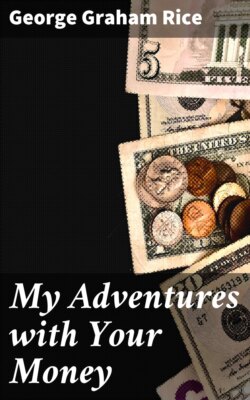Читать книгу My Adventures with Your Money - George Graham Rice - Страница 7
На сайте Литреса книга снята с продажи.
HOW "THE ONE BEST BET" WAS COINED
ОглавлениеTable of Contents
Our methods of advertising were unique. We used full pages whenever possible, and it was a maxim in the establishment that small type was never intended for commercial uses. We used in our big display advertisements a nomenclature of the turf that had never before been heard except in the vicinity of the stables, and we coined words and phrases to suit almost every occasion. The word "clocker," meaning a man who holds a watch on horses in their exercise gallops, was original with us, and has since come into common use, as has the phrase, "The One Best Bet," which we also coined.
It was our aim, in using the language of horsemen, to be technical rather than vulgar, the theory being that, if we could convince professional horsemen that we knew what we were talking about, the general public would quickly fall in line.
One morning we were alarmed to see in the Morning Telegraph, on the page opposite our own daily effort, the advertisement of a new tipster who called himself "Dan Smith." Dan went Maxim & Gay "one better" in the use of race-track terminology. He evidently employed a number of negro clockers, for the horse lingo which he used in his advertisements smelled of soiled hay and the manure pile. It was awful! But it made a hit with race-goers, and before a week had passed we recognized "Smith" as a dangerous competitor.
We were loth to believe that the use of this horsy language was entirely responsible for Smith's success, for we knew that his tips were not so good as ours. We investigated. His trick was this: In the sheet that he sent out to his customers, he would name for every race at least five horses as having a chance to win. He advised his clients, in varying terms, to bet on every one of them, and if any one of them won, he would print next morning what he had said on the preceding day regarding the winner alone, leading the public to believe that the only horse he had fancied was the actual winner.
I decided to organize another Bureau to knock out Dan Smith. The intention was "to go" our competitor "a few better" in the use of vulgar horse-racing colloquialisms and exaggerated claims, and thus nauseate the betting public and "put the kibosh" on Dan. We created a fictitious advertiser whom we named "Two Spot," and the next morning there appeared at our instigation in the Morning Telegraph a large display advertisement, headed substantially as follows:
TWO SPOT
Turf Info. Merchant
Terms, $2 Daily; $10 Weekly
Following the style which Dan Smith had adopted in his racing sheets, "Two Spot" mentioned in his first advertisement, as a sample of his line of "dope," four or five horses to win each race, each one in more grandiloquent terms than the other, but these were selected because they, in reality, appeared to be the most likely losers of all the entries.
A woman was sent over to the newly-organized office of "Two Spot" to take charge of the salesroom. I was completely taken off my feet the next day when she informed me that the receipts, as a result of the first advertisement, were in excess of $300, and that the public not only did not read between the lines, but had actually fallen for the hoax.
To cap the climax, on the second day one of the "outsiders" which "Two Spot" named derisively as the one best bet "walked in" at 40 to 1!
Next day "Two Spot" did a land-office business, and within a few days we figured that the "Two Spot" venture would net $1,000 a week if continued. "Two Spot" then went after the game hammer and tongs and endeavored to gage the full credulity of the public.
The distinctive difference between "Two Spot" and Maxim & Gay was this: Maxim & Gay, except in one instance, which is chronicled herein, never pretended to have selected a winner when it had not, while "Two Spot" enjoying the same source of information as Maxim & Gay, worded his daily advices to clients so artfully as to be able to claim the next morning in his advertisements à la Dan Smith, the credit of having said something good about every winner.
The profits of Dan Smith's venture, I was informed, exceeded a quarter of a million dollars the first year, and the profits of "Two Spot," whose career was cut short within a month by a realization on our part that we could not afford to be identified with such an enterprise, was divided among the employees of the "Two Spot" office. "Two Spot" had been brought into being for the purpose of killing opposition and not for profit-making. The scheme failed of its purpose.
To give an idea of the character of some of the raw kind of advertising put out by "Two Spot," and for which the public fell, I recall this excerpt from one of his tipping sheets:
I am my own clocker. I have slept under horse-blankets for thirty years. I understand the lingo of horses. Last night, when I was taking my forty winks in the barn of Commando, I heard him whinny to Butterfly and tell her to keep out of his way to-day because he was going to "tin-can" it from start to finish, and if Butterfly tried to beat him, he would "savage" her. That makes it a cinch for Commando. Bet the works on him to win.
